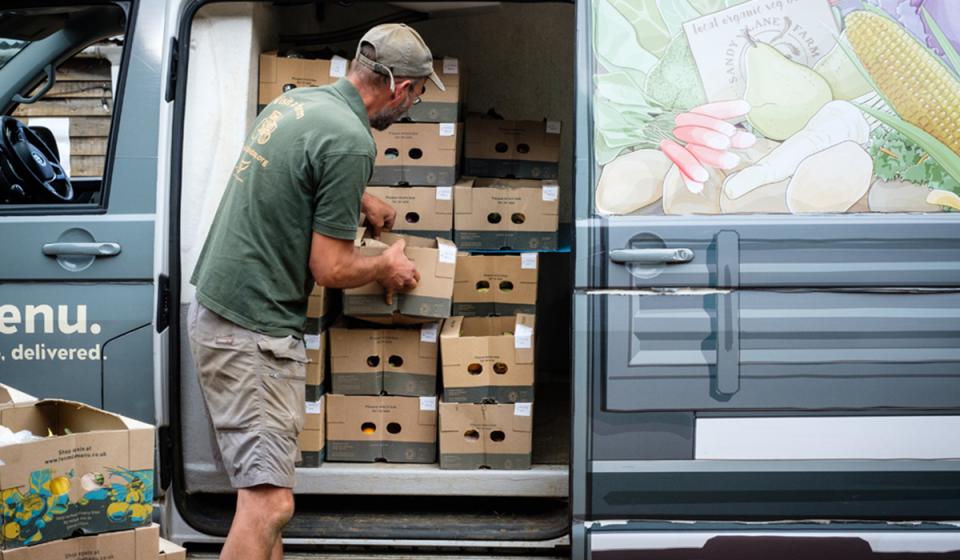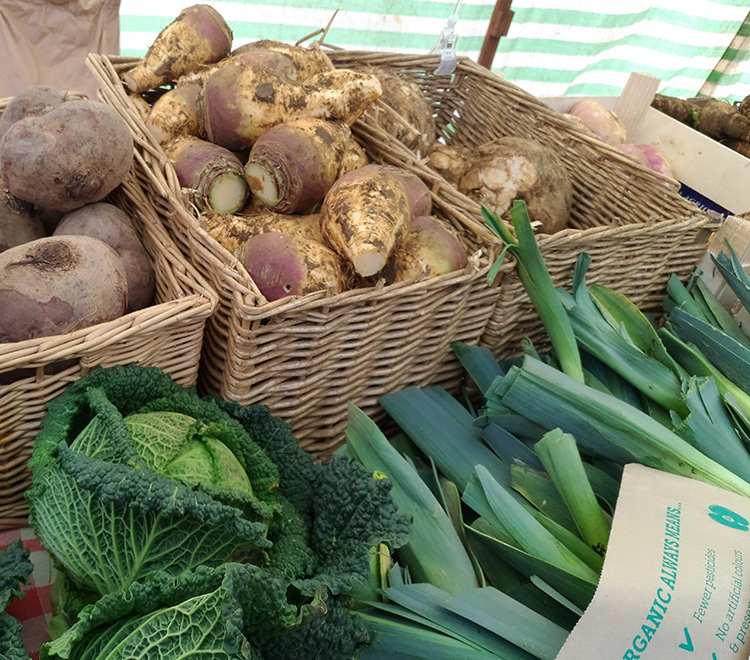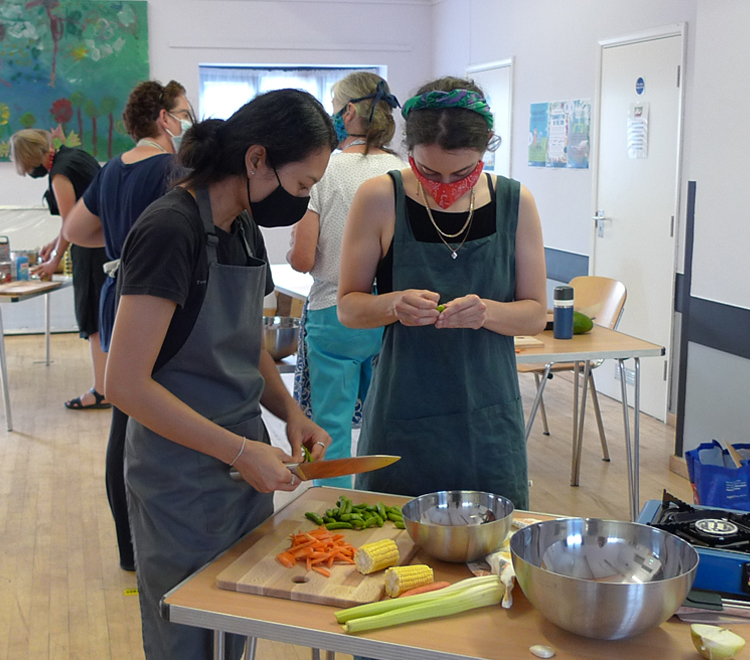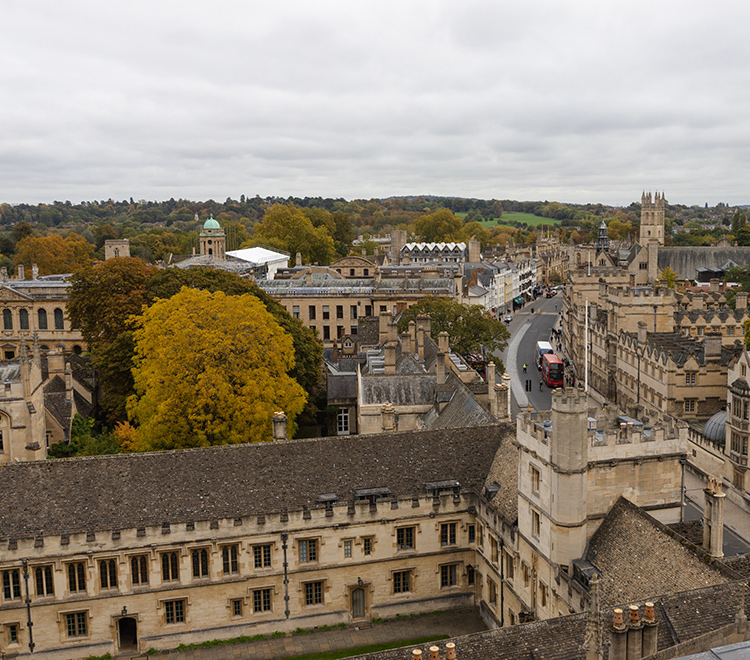The primary objective of our Living Lab is to examine the barriers that make it difficult for vulnerable local populations to adopt healthier and more sustainable eating habits. Through solution co-design and rigorous testing, we aim to identify and implement innovative strategies that enable these groups to integrate healthier and more sustainable food choices into their daily lives.
The Objectives:
- To identify the barriers to eating a healthy and sustainable diet and achieve food security for people living within our living lab test sites within Oxfordshire.
- To identify (through participatory processes) solutions and ways to make it easier for people in our living lab test sites to eat a healthy and sustainable diet and avoid food insecurity
- To co-design, implement, and test community and technological solutions with the members of our living lab
- To evaluate the effectiveness of these solutions in making it easier for participant groups to eat a healthy and sustainable diet.
- To evaluate the effectiveness of these solutions in reducing food insecurity
Video in English with English subtitles
Who we would like to support
During the original scoping activities several key characteristics of populations that use community–based food services were identified, including:
- Parents with children aged under 18
- Parents with children aged under 5 (preschool children)
- Expectant mothers
- Ethnic minorities
- Adults without children in the household
- Older adults 65+
- Frontline workers, staff, and volunteers who work at community-based food services.
Further exploratory work identified that the groups ‘parents with children under 5’ and ‘older adults 65+’ were deemed to be populations in greatest need. In discussion with community groups, the Oxfordshire LL has decided to focus on parents with children under 5 as our primary target group.
What’s coming next
The Oxfordshire Living Lab is currently working with community groups to design and run the proposed interventions, testing whether these interventions are successful. The evaluation phase will look at the effectiveness of these solutions in making it easier for participant groups to eat a healthy and sustainable diet, and in reducing food insecurity.
Local Food Challenges
Through the assessment and co-design phases of this research, we heard that many participants in our target group struggle with lack of knowledge, motivation, confidence and skills around cooking – including budgeting, planning, and different cooking techniques.. Our target group of parents with children under 5 also struggle with lack of time to shop and cook from scratch, often resorting to convenience foods for ease and preference. We also know that in certain wards/areas, fruit and vegetables at local fresh fruit and vegetable outlets are significantly more expensive than local supermarkets, making it more challenging for these communities to access affordable, nutritious foods. To address these barriers, our Living Lab is working closely with vulnerable communities to co-design effective and practical solutions that can be tailored to their specific needs and circumstances.
Living Lab Actions
Each community group has worked through three distinct phases of delivery:
The Assessment phase, investigating and measuring barriers to eating a healthy and sustainable diet, and achieving food security, via surveys and focus groups with target groups
The Solution design phase, co-designing community-based and technological-based solutions via community-based workshops with target groups
The Evaluation phase, measuring the effect of solutions on the transition to healthy and sustainable diets and food security in Oxfordshire
- READ FULL TEXT
The outcome of the co-design process was the development of a comprehensive, three-part approach, designed to empower target groups to make informed and sustainable dietary choices. These proposed activities leverage digital tools, community engagement, and hands-on workshops, aiming to foster lasting change in dietary habits. These interventions include the following components:
- A digital hub of healthy family-friendly recipes, evidence-based nutritional advice and meal plans, and a vibrant online community via GFO’s social media platforms to share recipes and drive online traffic to the digital hub
- Hands-on workshops hosted within local communities to provide practical experience in healthy and sustainable cooking
Get to know the region
In Oxfordshire, people on lower incomes are facing poorer diet-related health outcomes, including higher rates of type-2 diabetes and childhood obesity. For example, the most deprived areas of Oxfordshire have significantly higher levels of childhood obesity compared to the least deprived areas, with 11.5% of children in Reception and 24.4% of children in Year 6 classified as obese in the most deprived areas, compared to just 6.5% and 13.6% in the least deprived areas. While Oxfordshire generally has lower heart attack admission rates than the national average, in six of the county's most deprived wards, admission rates are considerably higher (Oxfordshire Insight, 2022; Oxfordshire JSNA, 2023).
Access to healthy, affordable food is a known issue. Evidence shows that in some of Oxfordshire’s most deprived areas, healthy and sustainable food is both less available and more expensive (Hansford et al., 2021; GFO, 2016, 2021). In fact, data suggests that around 100,000 people in Oxfordshire were experiencing food insecurity as of September 2022, based on national estimates and local insights into food bank and food larder usage (Food Foundation, 2022).
Frequently asked questions
- What is the history of the Living Lab?
The Good Food Oxford initiative has a rich history dating back to its inception in 2013, when a group of grassroots organisations, local businesses, and community members joined forces with the goal of creating a fairer, healthier and more sustainable food system for Oxford. Since then, we have formalised the central organisation and built a network of over 200 member organisations who have all signed the Good Food Charter – pledging actions that are Good for the Planet, Good for People and Good for Community. In 2021, we expanded beyond Oxford City and became countywide, rebranding as Good Food Oxfordshire (GFO). GFO operates as a central, backbone organisation to strategically organise and support connections between actors and activities to achieve our shared vision that everyone in Oxfordshire can access the healthy and sustainable food that they need, every day.
- Who are the stakeholders?
Our Living Lab in Oxfordshire involves a diverse group of stakeholders who play a critical role in achieving our goal of creating a fairer, healthier, and more sustainable food system. These stakeholders include:
- Local community organisations
- Local businesses
- Local institutions
- Policy makers – to create policies that support local food businesses, health of local people and sustainability of food sources
- Funders to enable them to focus on good food
- Advocates – both local and on a national scale to get them to share our content
- Potential volunteers
- Individuals wanting to change their behaviours
- What activities are conducted in the Living Lab?
We plan to leverage growth hacking techniques and workshops to co-design solutions with otherFEAST project partners. This includes developing interventions such as cooking skills and confidence building sessions, as well as providing recipe and facilities support
- What research has been conducted?
Our secondary research objectives include:
- Synthesizing of existing local research on food choices
- Mapping and evaluation of cooking-related interventions already happening across Oxfordshire such as cooking training and recipe sharing
- Conducting a gap analysis between needs assessment and current interventions available to target populations
Jessica Kopp
Project Lead at Good Food Oxfordshire
Jess@gfo.org.uk
University of Oxford, English
Testimonials from our community
Just being involved in this focus group and this research is making me think more about what I eat, and my family's diet. This has really helped me consider how and what we are eating at home.
We’ve seen how effective this [research] process has been in engaging with the community, we’re going to use focus groups in future as it’s such a good way to gather qualitative data




